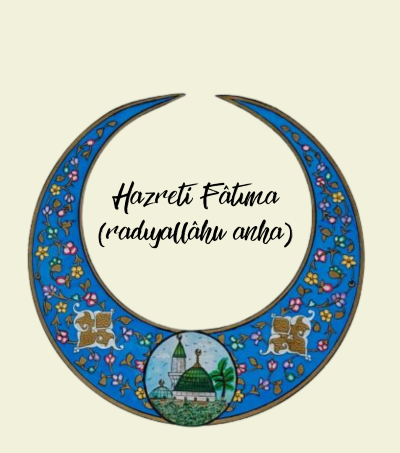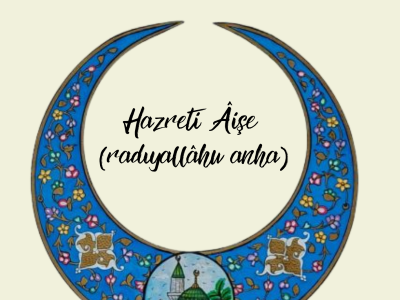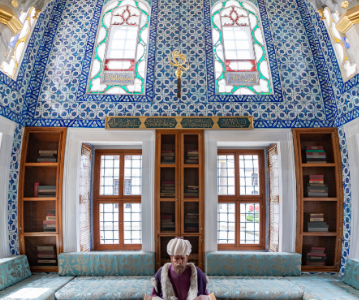The sun had risen, and the time for the Forenoon Prayer was approaching. Sorrow enveloped everyone and everything. The honorable Fatima (may God be pleased with her), unable to hold back her tears, was also engulfed in sorrow. Upon this, the Blessed Father said, “My daughter, be patient, do not cry. For the angels in heaven weep over your crying.” Upon hearing this, the honorable Fatima (may God be pleased with her) wiped her tears and sat beside her father.[1] When the Messenger of God (peace and blessings be upon him) began whispering something in the honorable Fatima’s ear, she started crying again. The beloved Prophet continued to whisper, and this time, a smile appeared on the honorable Fatima’s face.
This same smile and joy had appeared on the Prophet’s face in the year 606 when the Ka’ba was being rebuilt and when the honorable Fatima was born. The Prophet had daughters before the honorable Fatima, but our mother Fatima held a different place. Perhaps, the loss of her mother at a young age reminded the Prophet of his own orphaned upbringing.[2] “Fatima is a part of me. Whoever makes her happy, makes me happy, and whoever hurts her, hurts me,”[3] he said, indicating how deeply she was rooted in her father’s heart.
The Prophet was a man of loyalty. After the death of his grandfather, he was taken care of by his uncle, Abu Talib, and his aunt, Fatima. From the age of eight, she acted as a mother to the Prophet, prioritizing his needs over her own children’s.[4] Wishing to show gratitude to his aunt, who was like a mother to him, the blessed Prophet named his daughter Fatima “Umm Abiha,” meaning “her father’s mother, my mother.”[5] The Prophet’s first wife, the honorable Khadija’s (may God be pleased with her) mother’s name was also Fatima.
Fatima means “to wean” or “to abstain.” Due to her face being as bright as the moon, she was nicknamed “Zahra,” meaning “the bright, shining one,” and was also known as “Batul,” meaning “chaste and pure.”[6]
She found great happiness in being by her father’s side, trying to protect him. One day, when the Messenger of God (peace and blessings be upon him) was observing Prayer at the Ka’ba, the leaders of the disbelievers, including Abu Jahl, placed the entrails of a camel on his shoulders. While the disbelievers laughed, young Fatima rushed to clean the filth from her father, feeling a mix of anger and deep sorrow.[7]
When the honorable Fatima became a young woman, many sought her hand in marriage, but the Messenger of God (peace and blessings be upon him) kindly refused all. When the honorable Ali (may God be pleased with him) asked for her hand, the Prophet accepted. However, the honorable Ali was a poor young man, lacking the means to provide a dowry. Thus, he sold his share of the spoils from the Battle of Badr, and according to some reports, his camel and some belongings, to provide a dowry of about 450 silver dirhams. The honorable Fatima’s dowry included a velvet cloth, a leather pillow stuffed with date palm fibers, two hand mills, and two leather water bags.[8] Thus, the blessed union of the honorable Ali and the honorable Fatima was established. This happy marriage was blessed with the births of the honorable Hasan and, a year later, the honorable Husayn, followed by Umm Kulthum, Zaynab, and Muhassin, who died at a young age.[9]
The honorable Fatima’s sacrifices during the Battle of Uhud are legendary. She carried provisions to the front and tended to the wounded, including her beloved father. When washing the Prophet’s wound, she noticed water increased the bleeding, so she took a piece of mat, burnt it, and applied the ash to the wound, which soon stopped the bleeding.[10] As these events unfolded, the Prophet prayed, “O God, forgive my people, for they do not know.”[11]
Fatima’s life, like the Prophet’s, was simple. She resembled him in her every manner and action. After marrying the honorable Ali, they divided household responsibilities: the honorable Fatima managed the home, while the honorable Ali took care of external affairs. Tired from using the hand mill, Fatima once heard about captives arriving in Medina and asked her father for a servant. The Messenger of God (peace and blessings be upon him) refused, saying those captives were for the destitute Muslims of the mosque[12] but advised her instead to recite “Subhanallah” 33 times, “Alhamdulillah” 33 times, and “Allahu Akbar” 33 times before sleep,[13] which the honorable Ali affirmed she never neglected.
The honorable Fatima was the Prophet’s cherished pearl, raised with love and affection. The Messenger of God (peace and blessings be upon him) showed his love for her with his words and actions. When Fatima visited, he would stand up, greet her, and seat her in his place. Fatima reciprocated similarly. The Prophet would first visit the mosque to pray two rakats upon returning from travels, then visit the honorable Fatima.[14]
The Messenger of God (peace and blessings be upon him) often visited the honorable Ali and Fatima’s home, sitting between them and expressing his love. Once, he covered them and their children, Hasan and Husayn, with his cloak and prayed for their protection and purification. An important aspect of the honorable Fatima’s life is that the Prophet’s lineage continued through her children.[15]
As the sun set and Gabriel (peace be upon him) announced the approaching time of reunion and the honorable Azrael’s (peace be upon him) request to present himself, the honorable Fatima, deeply attached to her father, was shaken by his passing. After the Prophet was buried, she asked Anas ibn Malik, “How could you bring yourselves to bury the Messenger of God so quickly?” and wept for days.[16]
The honorable Aisha asked the honorable Fatima after the Prophet’s death, “What did the Prophet whisper to you that made you cry and then laugh?” Initially, Fatima hesitated, considering it a secret between her and her father, but later shared: “He told me of his impending death, which made me cry. Seeing my tears, he then told me that I would join him first from his household and that I am the lady of the believing women, which made me smile.”[17]
Fatima could only endure six months after her father’s departure, passing away in 632. Her wish was to be buried at night, like the Prophet. She was buried in Jannatul Baqi Cemetery by the honorable Ali, the honorable Abbas, and her son Fazl.[18]
Today, the honorable Fatima is remembered in the Islamic world as a symbol of Islam’s noble values, embodying love and strength. She carried the light of the Prophet in her heart without dimming, striving to show the beauty of Islam to all. Followers of the right path draw inspiration from her life, spreading love, compassion, and tolerance throughout the world. May we be among those who earn her intercession. Amen!
[1] Rahime Kaya, Efendiler Efendisi Hazreti Muhammed (sallallahu aleyhi ve sellem), Asrı Saadet Serisi-1, İzmir: Muştu Yayınları, 2009, p. 269.
[2] Ömer Yılmaz, Hazreti Fâtıma (radıyallahu anha), Gül Devri-8, İzmir: Muştu Yayınları, 2013, p. 11.
[3] Bukhari, Fadailu Ashabi’n-Nabi, 12, 29.
[4] Yılmaz, ibid, p. 11.
[5] M. Yaşar Kandemir, Mustafa İsmet Uzun, “Fâtıma”, TDV İslâm Ansiklopedisi.
[6] Ibid.
[7] Bukhari, Wudu, 69; Muslim, Jihad, 107–110.
[8] Kandemir and Uzun, ibid.
[9] Yılmaz, ibid, p. 31.
[10] Muslim, Jihad, 101.
[11] Yılmaz, ibid, p. 57.
[12] Ibid, p. 57.
[13] Bukhari, Fadailu Ashabi’n-Nabi, 9, Nafaqat, 6-7, Da’awat, 11.
[14] Yılmaz, ibid, p. 25
[15] Ibid, p. 28.
[16] Kandemir and Uzun, ibid.
[17] Bukhari, Fadailu Ashabi’n-Nabi, 12, Istiʾzân, 43; Muslim, Fadailu Ashabi’n-Nabi, 97–99.
[18] Kandemir and Uzun, ibid.




